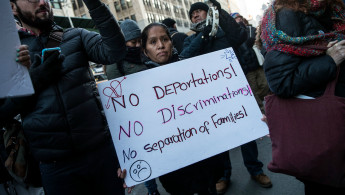US judge urged to expand order to block deportation of Iraqis
In a court filling on Saturday, attorneys representing the immigrants and the American Civil Liberties Union of Michigan say more than 1,400 Iraqi nationals could be deported and face "the very real probability of persecution, torture or death" based on the recent government actions. The filing seeks class-action status for the case.
"These individuals, many of whom have lived in the United States for decades and have US citizen spouses and children, now face deportation as a result of (US Immigration and Customs Enforcement's) sudden decision to remove them based on removal orders, which may be decades old," according to an amended complaint filed in federal court in Detroit.
The filing follows an order issued on Thursday by US District Judge Mark Goldsmith that allows the 114 Detroit area immigrants, some with criminal records and others who overstayed their visas, to stay in the country for two weeks while he decides if the court has jurisdiction.
The latest filing said that even though most of the Iraqis were ordered to be deported years ago, "the government released them, often under orders of supervision."
Most of those arrested in the Detroit area were Chaldeans, or Iraqi Catholics.
Many have lived in the US so long that they no longer speak Arabic, immigration lawyers and activists say.
Some of those arrested in recent weeks had criminal convictions for crimes including assault, rape, murder, burglary, drug trafficking, and other offenses.
But many of those slated to be deported came to the United States as children and have already served sentences for their crimes, some of which were committed over 25 years ago.





 Follow the Middle East's top stories in English at The New Arab on Google News
Follow the Middle East's top stories in English at The New Arab on Google News
![The UAE is widely suspected of arming the RSF militia [Getty]](/sites/default/files/styles/image_330x185/public/2024-11/GettyImages-472529908.jpg?h=69f2b9d0&itok=Yauw3YTG)
![Netanyahu furiously denounced the ICC [Getty]](/sites/default/files/styles/image_330x185/public/2024-11/GettyImages-2169352575.jpg?h=199d8c1f&itok=-vRiruf5)
![Both Hamas and the Palestinian Authority welcomed the ICC arrest warrants [Getty]](/sites/default/files/styles/image_330x185/public/2024-11/GettyImages-2178351173.jpg?h=199d8c1f&itok=TV858iVg)